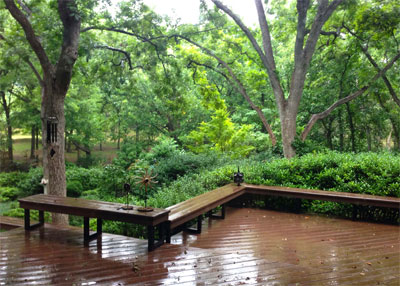From the Sperry Gardens: August 2014
 This has been an unusual year climatically. Many parts of East Texas have had generous quantities of rain. Lakes are full or nearly full, and gardeners are smiling. Even parts of West Texas have had periodic rainstorms to help bridge gardeners through until fall.
This has been an unusual year climatically. Many parts of East Texas have had generous quantities of rain. Lakes are full or nearly full, and gardeners are smiling. Even parts of West Texas have had periodic rainstorms to help bridge gardeners through until fall.
I live and garden in Collin County. We haven’t had those big rain events, so partially because of the drought and partially because our growth has far outpaced our water resources, we are allowed to run lawn and landscape sprinklers only every two weeks.
So that’s where Facebook came in. I told the roughly 30,000 people on my FB page that I could define the word “conundrum” in horticultural terms: It was Monday (three days ago). Rain was forecast for Wednesday (yesterday) and Thursday (today). I have been speaking on behalf of a statewide initiative for water conservation, so I am more determined than ever to save water – and my water day was this past Tuesday (two days ago).
What was I to do? I could have watered, knowing that it might end up having been unnecessary if it were to rain heavily. Or I could have chosen not to water, in which case I was taking a chance that my plants might go dry for four weeks.
I chose to water. With one acre of landscaping, I have too much invested not to run the sprinklers. We have six or seven weeks of potentially really hot weather ahead, and I wasn’t willing to gamble.
Say what you will about oil, but water is the natural resource that impacts most of us most directly. We need to rethink how that water is shared among Texans. The answer isn’t going to be easy, but here are a few of my own personal thoughts I’ve been setting aside. We should:
• Continue to learn about water-efficient plants and educate the public. This DOES NOT translate directly to native Texas plants. Crape myrtles, for example, are water-efficient, and they’re native to China. Bald cypress trees are not water-efficient, yet they’re native to Texas (primarily East Texas).
• Xeriscaping is not the final answer, at least not along and east of I-35. While the plants from arid areas may do well much of the time in the eastern half of the state, prolonged rainy spells do occur, and those plants may not be able to survive the wet soils. Once again, the term “adapted” kicks to the forefront.
• Prepare soil well prior to planting. Soils that have been prepared carefully, with ample organic matter mixed in in the process, allow better water penetration, and they retain moisture longer.
• Water deeply and infrequently. Challenge your plants to grow deeper roots. They’ll be better able to survive the challenging times.
• Mulch your beds, and keep them weed-free. Both are ways you can prevent loss of water that is already in the soil.
Water Restrictions
And then there are the water curtailments. Before they are imposed, there are several things I feel would be better beginnings. Again, just one guy’s opinions:
• Require that all sprinkler systems be installed and regularly maintained by a licensed irrigator. (The first part is already in effect.)
• Require that sprinkler systems be checked annually by a licensed irrigator. We do it to our cars. We ought to do it for our sprinklers – be sure they are functioning properly. One time per year probably isn’t often enough, but it’s a big bunch better than what happens now. Many people have their systems installed and never give them “check-ups” again.
• In this day and age of “smart meters” that tell the water companies exactly when water is being used, how difficult would it be to create “Mulligans?” They could allow us to take passes on watering on our designated days if rain were forecast, giving us the option to irrigate, say, three days later. There must be some way. For each one of my water days so far this summer, rain has been forecast for the following day. I would have loved to be able to wait — to see if I really needed to be watering.
• Finally, rather than strictly using days of the week to determine when I water, I would be willing to let price enter the picture. Give me a “water quota,” that is, a “water budget.” If I use more water, figure a fair increase in my rate for that overage. I’ll make the decision of which plants matter the most and whether I really want to spend the extra money keeping others going.
These ideas aren’t intended to offer any final solutions to this sticky situation, so don’t bother taking a lot of exceptions to what I’ve written. I’ve been without e-mail for most of this week, and my mind is a little preoccupied with that whole mess. I just wanted to get the great minds of Texans thinking about alternative ways to enjoy the world’s greatest hobby while being responsible stewards of our water resources.
